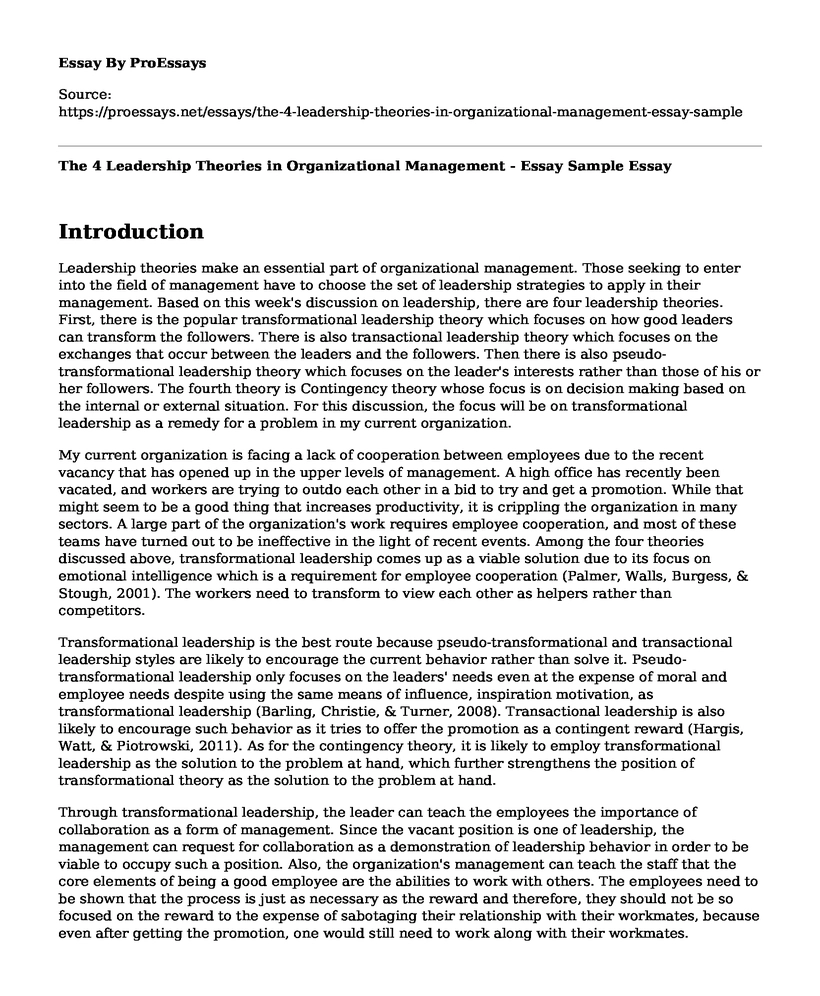Introduction
Leadership theories make an essential part of organizational management. Those seeking to enter into the field of management have to choose the set of leadership strategies to apply in their management. Based on this week's discussion on leadership, there are four leadership theories. First, there is the popular transformational leadership theory which focuses on how good leaders can transform the followers. There is also transactional leadership theory which focuses on the exchanges that occur between the leaders and the followers. Then there is also pseudo-transformational leadership theory which focuses on the leader's interests rather than those of his or her followers. The fourth theory is Contingency theory whose focus is on decision making based on the internal or external situation. For this discussion, the focus will be on transformational leadership as a remedy for a problem in my current organization.
My current organization is facing a lack of cooperation between employees due to the recent vacancy that has opened up in the upper levels of management. A high office has recently been vacated, and workers are trying to outdo each other in a bid to try and get a promotion. While that might seem to be a good thing that increases productivity, it is crippling the organization in many sectors. A large part of the organization's work requires employee cooperation, and most of these teams have turned out to be ineffective in the light of recent events. Among the four theories discussed above, transformational leadership comes up as a viable solution due to its focus on emotional intelligence which is a requirement for employee cooperation (Palmer, Walls, Burgess, & Stough, 2001). The workers need to transform to view each other as helpers rather than competitors.
Transformational leadership is the best route because pseudo-transformational and transactional leadership styles are likely to encourage the current behavior rather than solve it. Pseudo-transformational leadership only focuses on the leaders' needs even at the expense of moral and employee needs despite using the same means of influence, inspiration motivation, as transformational leadership (Barling, Christie, & Turner, 2008). Transactional leadership is also likely to encourage such behavior as it tries to offer the promotion as a contingent reward (Hargis, Watt, & Piotrowski, 2011). As for the contingency theory, it is likely to employ transformational leadership as the solution to the problem at hand, which further strengthens the position of transformational theory as the solution to the problem at hand.
Through transformational leadership, the leader can teach the employees the importance of collaboration as a form of management. Since the vacant position is one of leadership, the management can request for collaboration as a demonstration of leadership behavior in order to be viable to occupy such a position. Also, the organization's management can teach the staff that the core elements of being a good employee are the abilities to work with others. The employees need to be shown that the process is just as necessary as the reward and therefore, they should not be so focused on the reward to the expense of sabotaging their relationship with their workmates, because even after getting the promotion, one would still need to work along with their workmates.
If the management manages to achieve such an outcome, that is teaching the staff members the importance of preserving work relationships. They would have transformed their employees hence demonstrating transformational leadership. Also, the management itself would have been transformed as it assumed the role of a teacher by teaching their workers about the ethics of the work environment and standards.
References
Barling, J., Christie, A., & Turner, N. (2008). Pseudo-transformational leadership: Towards the development and test of a model. Journal of Business Ethics, 81(4), 851-861.
Hargis, M. B., Watt, J. D., & Piotrowski, C. (2011). Developing leaders: Examining the role of transactional and transformational leadership across business contexts. Organization Development Journal, 29(3), 51.
Palmer, B., Walls, M., Burgess, Z., & Stough, C. (2001). Emotional intelligence and effective leadership. Leadership & Organization Development Journal.
Cite this page
The 4 Leadership Theories in Organizational Management - Essay Sample. (2023, Apr 08). Retrieved from https://proessays.net/essays/the-4-leadership-theories-in-organizational-management-essay-sample
If you are the original author of this essay and no longer wish to have it published on the ProEssays website, please click below to request its removal:
- Starting a Business Is a Risky Endeavor Paper Example
- Essay Sample on Corporate Governance
- The Elasticity of a Product: Claire's Makeup Products Paper Example
- Essay Example on Teamworking
- Leadership and Management in Nursing E-Portfolio
- Essay Sample on Creating a Needs Statement & Management Plan for a Police Department
- Essay Example on Pegasus: Technology Leadership in New Millennium







